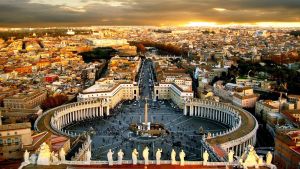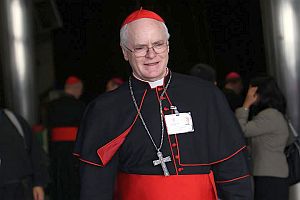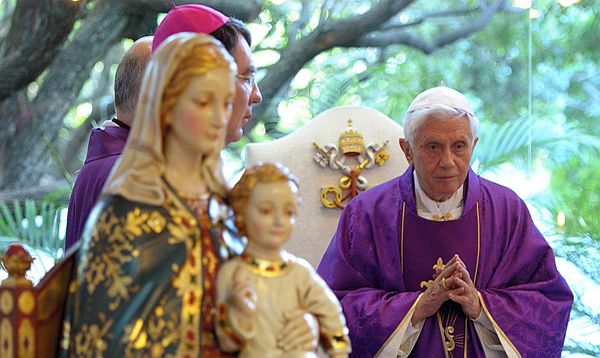Mexico City, Mexico - Latin America senses an opportunity to break Europe's grip on the papacy as Pope Benedict's decision on Monday to step down stirs hopes the world's biggest Roman Catholic bloc may finally get to lead the Church.
Home to 42 percent of the world's 1.2 billion Catholics, Latin America far outweighs Europe's 25 percent, although the Church has for years been losing ground to Protestant and evangelical rivals across the region.
Ever since Rome broke with a longstanding tradition in 1978 by appointing a non-Italian pope, John Paul II, the faithful of Latin America have harbored hopes that one of their own would soon take charge of the largest flock in Christendom.
"A Latin American pope would be good politics by the Church. There are many Catholics here, but they're losing their share in the market," said Acacia Ramirez, a 36-year-old actuary, as she headed to work in Mexico City.
As recently as 1970, about 96 percent of Mexicans pledged allegiance to the pope in Rome. However, over the past four decades, millions have turned to evangelical Protestantism and other churches - or abandoned religion completely.
Between 2000 and 2010, the percentage of Catholics in Mexico fell from 88 percent to less than 83 percent. That was sharpest drop since records began. The decline in Brazil, which is home to the world's biggest Catholic population, has been even more precipitous.
A 2010 census showed that just over 120 million Brazilians call themselves Catholics - about 65 percent of the population, compared with over 90 percent of Brazilians in 1970.
Some top Latin American clerics mused openly about change.
"It could be time for a black pope, or a yellow one, or a red one, or a Latin American. Or it could be time for an Asian pope, or one from another continent," Guatemala's Archbishop Oscar Julio Vian Morales said after Benedict's announcement.
Benedict never captured the imagination of Latin American churchgoers in the same way as Polish-born John Paul, who visited the region several times and whose portrait still adorns the walls of homes and stores nearly eight years after his death.
 |
| 'A Latin American pope would be good for the Church' |
Hopes for Peace
Sitting in the shade of an enormous statue of John Paul outside the basilica of the Virgin of Guadalupe in Mexico City, 57-year-old housewife Carmen Angel said she hoped the next pope would watch closely over Latin America. "I think it would be very positive if the next pope were to be from Mexico," said Angel, on a pilgrimage from the city of Puebla with her family.
Aside from the German-born Benedict and his predecessor John Paul, Italy has dominated the Vatican for centuries. There are 19 cardinals in Latin America who could now be in the running, including five from Brazil and three from Mexico.
Jesus Muro, a Mexico City chauffeur, said a Latin American pope would be a pacifying influence on the region, which includes some of the world's most violent countries. "There would be less violence and less discontent among those with less," said Muro, 42, who attends mass every Sunday.
In Honduras, which has the world's highest murder rate, some believers said they hoped divine intervention could help the chances of a local cardinal, Oscar Andres Rodriguez. Rodriguez was seen as a candidate to succeed John Paul last time around, though his reputation suffered after he openly supported the ouster of former leftist President Manuel Zelaya in 2009.
In Chile, where John Paul branded General Augusto Pinochet a dictator during a visit in the late 1980s, some say they yearn for a pope who understands them. "I feel very distant from the pope, from the Vatican. So much pomposity and wealth," said teacher Grecia Opazo, 50. "It would be good for the pope to know about the problems we have here."
Latin America has been getting closer to the top job.
Popular Argentine
 |
| Odilo Scherer, archbishop of Sao Paolo, Brazil is one of Latin America's leading canidates for the papacy |
In 2005, following the election of then-Cardinal Joseph Ratzinger as Benedict XVI, it was reported that on each of the previous four ballots, Argentina's Jorge Mario Bergoglio received the 2nd highest number of votes.
Odilo Scherer, 63, archbishop of the huge diocese of Sao Paolo, and the 69-year-old Italian-Argentine Leonardo Sandri, head of the Vatican department for Eastern Churches, have been tipped as Latin America's leading candidates this time.
"It would be a revolution if a Latin American took over as the pope," said Alberto Levinson, a 56-year-old psychologist and devout Catholic in Buenos Aires. "Jesus Christ lived for the poor, not for the rich."
The pope's health has looked increasingly delicate in recent months, but many wondered what prompted his decision to become the first pontiff since the Middle Ages to resign.
During his papacy, Benedict faced a series of crises in the Church, ranging from child sex abuse scandals to the leaking of his private papers by his butler.
Church elders in Brazil said the pope's departure could pave the way for a modernization of the Church, with the archbishop of Salvador, Murilo Krieger, calling it "an honest gesture". Today many Brazilians increasingly look toward evangelical denominations or eschew religion altogether as the country grows more urban and prosperous.Senior Vatican officials have dropped hints that the next pope could be from Latin America or Africa.
"They're looking for a man with fairly worldwide experience - from Japan, to Alaska, and from Chile up as far as Canada," William Slattery, Archbishop of Pretoria, stated.
"Today, the Catholic Church is tremendously strong in South America. They have been expecting a pope for a long time," he said. "Africa is the place where the church has become very strong over recent years, so Africa will have its own claims."
Peter Turkson from Ghana, now head of the Vatican's justice and peace department, is often tipped as Africa's front runner.


